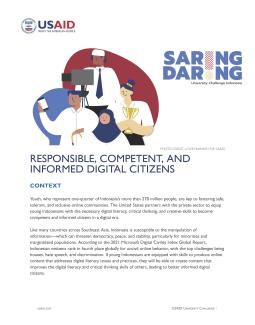Context
Youth, who represent one-quarter of Indonesia’s more than 270 million people, are key to fostering safe, tolerant, and inclusive online communities. The United States partners with the private sector to equip young Indonesians with the necessary digital literacy, critical thinking, and creative skills to become competent and informed citizens in a digital era.
Like many countries across Southeast Asia, Indonesia is susceptible to the manipulation of information—which can threaten democracy, peace, and stability, particularly for minorities and marginalized populations. According to the 2021 Microsoft Digital Civility Index Global Report, Indonesian netizens rank in fourth place globally for uncivil online behavior, with the top challenges being hoaxes, hate speech, and discrimination. If young Indonesians are equipped with digital competence and analytical skills, they will be able to produce online content that improves the skills of others, leading to better informed digital citizens.
Saring Daring University Challenge (U-Challenge)
Through U-Challenge, a partnership with Meta, and Love Frankie, the United States Agency for International Development (USAID) will equip young Indonesians with the necessary digital literacy and critical thinking skills to become competent and informed citizens in the digital era.
U-Challenge will engage students from 10 Indonesian universities in South Sumatra, Riau, Banten, Yogyakarta, East Java, Bali, West and East Kalimantan, South Sulawesi, and East Nusa Tenggara provinces to promote digital literacy, critical thinking, and positive online communications. Students will create digital content, such as for social media, and contribute to a community of responsible, competent, and informed digital citizens across Indonesia.
Through a nationwide competition, U-Challenge will provide space for university students to create and disseminate video messages to educate Indonesian citizens on best practices for staying safe online and practicing responsible digital citizenship. The program will utilize tools on misinformation/disinformation and media literacy developed by Meta and other partners to cover topics in areas such as cybersecurity, democracy, and privacy.
Anticipated Results
The project aims to achieve the following results:
- Improve the ability of 150 university students to create and disseminate content on digital literacy issues and practices.
- Enhance the awareness of 150,000 students and their networks on digital literacy issues and practices.
- Increase the engagement of 75,000 students and their networks with messages on digital literacy issues and practices.
Contact
Yahya Luping, USAID Indonesia at yluping@usaid.gov
Thaniya Theungsang, Love Frankie at thaniya@lovefrankie.co


